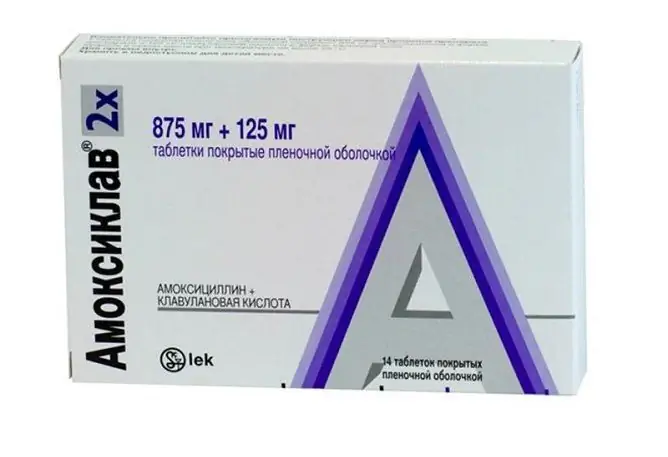- Author Rachel Wainwright wainwright@abchealthonline.com.
- Public 2023-12-15 07:39.
- Last modified 2025-11-02 20:14.
Antibiotics for angina for adults in tablets: list, application features
The content of the article:
- Diagnostics of the sore throat
-
What antibiotics to drink for angina in adults
- Choosing a drug for antibiotic therapy
- Features of the use of antibiotics during pregnancy and lactation
- Complementary therapy
- Video
Antibiotics for angina in tablets for adults are most often prescribed. This form of the drug is well absorbed and has a systemic effect, contributing to the eradication of the causative agent of the disease.

For angina in adults, antibiotics are usually given in pill form.
Angina, or acute tonsillitis, develops as a result of penetration of pathogenic microorganisms into the mucous membrane of the tonsils: staphylococci, streptococci, anaerobes. Combined infection is possible. Among bacteria, the most common causative agent of angina is group A beta-hemolytic streptococcus.
In the overwhelming majority of cases, the follicular apparatus of the palatine tonsils is exposed to inflammatory lesions.
In the human body, against the background of a decrease in general and local immunity, a bacterial agent that has entered the airborne or alimentary way is introduced into the mucous membrane of the tonsils, promotes the migration of leukocytes, the appearance of edema, and the active formation of antibodies in the body.

The causative agent of the disease is most often transmitted by airborne droplets
Due to the fact that angina develops as a hyperergic reaction, this serves as a prerequisite for complications such as rheumatism, myocarditis, acute glomerulonephritis and other diseases of an infectious-allergic nature associated with antigens of group A beta-hemolytic streptococcus.
Therefore, confirmation of the streptococcal etiology of acute tonsillitis is an indication for the appointment of antibiotic therapy.
Diagnostics of the sore throat
Bacterial infection is diagnosed by the clinical manifestations of the disease, the data of laboratory and instrumental studies.
The most common symptoms of an infection of the tonsils:
- a sharp pain in the throat that worsens when swallowing;
- high body temperature;
- chills;
- headache, muscle and joint pain.
On examination, the tonsils, arches and soft palate are hyperemic, edematous. In the lacunae of the tonsils and on the surface of the mucous membrane, fibrin plaque or purulent discharge is determined.
In the clinical analysis of blood, an increase in the number of leukocytes, neutrophilia, an increase in the erythrocyte sedimentation rate (ESR) is noted.

To determine the sensitivity to antibiotics, bacteriological inoculation of the discharge from the surface of the tonsils is carried out
The patient undergoes bacteriological inoculation of the discharge from the surface of the tonsils or from the lacunae, followed by determination of sensitivity to antibiotics. Also for express diagnostics there is a test based on the determination of the antigen of group A beta-hemolytic streptococcus.
What antibiotics to drink for angina in adults
In adults, antibiotic treatment of sore throat is key to the treatment of bacterial sore throat. The drugs are prescribed in the form of tablets, powder or solution for injection.
Choosing a drug for antibiotic therapy
List of antibiotics for purulent sore throat:
- penicillins: Amoxicillin, Amoxiclav, Augmentin, Flemoxin Solutab;
- cephalosporins: Ceftriaxone, Cefadroxil, Cefuroxime;
- macrolides: Azithromycin, Clarithromycin, Spiramycin, Roxithromycin;
- lincosamides: Lincomycin, Clindamycin.
Macrolides are prescribed for intolerance to antibiotics of the penicillin series or cephalosporins, and in the presence of allergy to macrolides, lincosamides are indicated.

The antibiotic is prescribed based on the suspected or confirmed pathogen
The choice of an antibiotic for angina depends on the alleged or confirmed pathogen, the severity and duration of the inflammatory process. What exactly to take the drug and how many days to treat a sore throat, the doctor decides: a therapist, otorhinolaryngologist or infectious disease specialist.
After choosing the right antibiotic, it is better to start treatment immediately.
For the treatment of acute streptococcal tonsillitis, the first-line drugs are beta-lactam antibiotics. In view of the possible resistance of the pathogen, the use of amoxicillin / clavulanate (Amoxiclav) seems to be more reliable. The drug has a wide spectrum of action. It is active against pyogenic streptococcus, Staphylococcus aureus, Clostridia, pneumococcus, gonococci, enterobacteria, fusobacteria.

For streptococcal sore throat, beta-lactam antibiotics, such as Amoxiclav, are commonly used
The beta-lactamase inhibitor (clavulanic acid) in the preparation expands the spectrum of the antibiotic and makes it active against amoxicillin-resistant bacteria that produce the enzyme beta-lactamase.
The names of modern medicines may vary, and the active ingredients in them may be the same.
The antibiotic Augmentin also contains amoxicillin in combination with a beta-lactamase inhibitor. The agent has a bactericidal effect on a large number of gram-positive and gram-negative aerobic and anaerobic bacteria.

Flemoxin Solutab is one of the effective drugs for the treatment of angina
Flemoxin Solutab is an effective antibacterial drug that copes well with beta-hemolytic streptococcus. It is available in the form of soluble tablets, due to which the active substance - amoxicillin - is absorbed almost completely, creating a high concentration in the blood and accumulating in the mucous membranes. Food intake has practically no effect on its absorption.
To eradicate the pathogen, a 10-day antibiotic intake is required. An exception is the drug Azithromycin, which is prescribed in tablets, 1 piece per day (dosage 500 mg) for 5 days. One package is enough for the course of treatment.
Antibiotics of the cephalosporin group are distinguished by a wider spectrum of antimicrobial action, but the intestinal microbiota is significantly affected.
Early treatment will significantly reduce the duration and severity of sore throat symptoms. It is unacceptable to reduce the course of antibiotic therapy with clinical improvement. This can lead not only to the development of resistant strains of bacteria, but also contribute to the chronicity of the process.
Features of the use of antibiotics during pregnancy and lactation
The question of prescribing antibiotics during pregnancy is decided individually in each case. This is possible if the expected positive result from the use of the drug exceeds the risk of developing side effects, including the fetus.

The question of the possibility of using antibiotics during pregnancy and lactation is decided individually.
With the development of sore throat in a woman while breastfeeding a child, it is necessary to transfer the baby to artificial mixtures and not breastfeed until he recovers. During antibiotic therapy, breast milk will contain a high concentration of an antibacterial substance, which will negatively affect the microflora of the baby. The mother can then continue with HB (breastfeeding).
Complementary therapy
With antibiotic therapy, probiotics must be prescribed, which will help restore the intestinal flora. There are a large number of inexpensive good preparations containing bifidobacteria and lactobacilli: Acipol, Lactobacterin.

Against the background of antibiotic therapy, bifidobacteria and lactobacilli should be prescribed
Unreasonable preference for local treatment to the detriment of systemic antibiotic therapy. Existing sprays, aerosols, lozenges and rinsing solutions with antimicrobial action can only be used as an adjunct to the main treatment of bacterial sore throat.
Local preparations with lidocaine and peppermint quickly relieve severe sore throat. In case of swelling of the tonsils and oropharyngeal tissues, Paracetamol may be prescribed, which will act against inflammation.
Sore throat treatment is carried out in most cases at home. In case of a severe or complicated course of the disease, the patient is hospitalized in an infectious diseases hospital.
Hospitalization is also carried out for specific angina against the background of infectious infectious diseases: scarlet fever, measles, diphtheria, etc.
Repeated microbiological examination is carried out 2-3 weeks after the end of the course of injections or antibiotic tablets. Control culture is mandatory in the presence of streptococcal tonsillitis. This avoids the recurrence of the disease, the development of a number of rheumatic and infectious (otitis media, bronchitis, pyelonephritis) complications, as well as the transition of the disease into a chronic course.
Video
We offer for viewing a video on the topic of the article.

Alina Ervasova Obstetrician-gynecologist, consultant About the author
Education: First Moscow State Medical University. THEM. Sechenov.
Work experience: 4 years of work in private practice.
Found a mistake in the text? Select it and press Ctrl + Enter.






